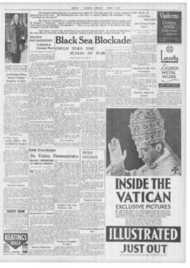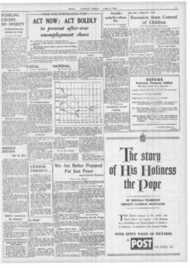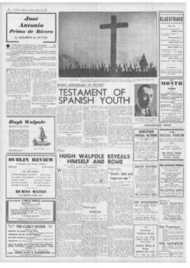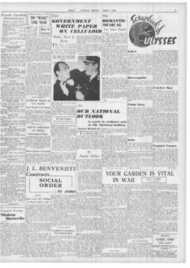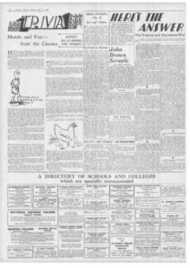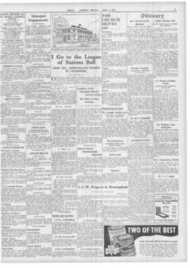Page 2, 5th April 1940
Page 2
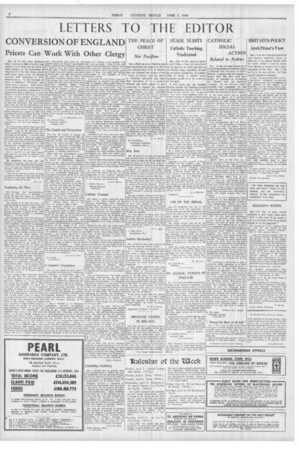
Report an error
Noticed an error on this page?If you've noticed an error in this article please click here to report it.
Tags
Share
Related articles
New Link On May 4
How Can The Conversion Of England Be Hastened?
Half Way House Wanted For Noncatholics
Letters To The Editor
CONVERSION OF ENGLAND
Priests Can Work With Other Clergy
SIR,—It is with some diffidence that I venture to offer a further suggestion to the many now set forth in your columns on the Conversion of England. It is that the clergy should participate more freely in clerical reunions with clergymen of other denominations. In this borough we have a Ministers' Fraternal that meets once a quarter. After standing to silent prayer for two minutes, we conduct the purely administrative
business and then a conference on some subject of interest to the clergy is given by some outside speaker of note, followed by a " free-for-all " aiscussion in which each speaker is entitled frankly to state his viewpoint The conference then sums up and the proceedings terminate with tea and friendly intercourse.
We have also another inter-denominational organisation, linked up with the Christian Council of Social Service, to deal with the Christian and moral aspects a public affairs in the borough.
Thus, if I may so put it, there is an organisation for talk and another for action.
Now the strange part is that I am the only Catholic priest in the borough who attends. I was on the executive committee of the first organisation and vicechairman of the second. I feel that this work must do good. But I am alone In this view; and am frequently criticised by my brother-priests and even by many of my excellent parishioners on the ground that I consent, by my presence, " to reduce the One True Church of Jesus Christ to the level of a sect."
Am I eccentric or are they bigots? And iserw can we hope to influence our separated brethren if we keep away from them?
My experience has been that the
Catholic viewpoint has always been listened to with extraordinary interest; and in all practical matters affecting the borough ultimately adopted—at least by a majority vote.
I think such reunions provide at least a means of helping to stop the decay of Christianity and may ultimately help to promote a Catholic revival.
T. J. F.
Explaining the Mass
R,—Perhaps the correspondence about the Conversion of England is going off into the vague, or exhibits chiefly the departmental preferences of each writer.
The subject is in fact too large. It implies altering a national mind, and we well may ask if such a thing exists about religion, anyway. U am soon to lecture, so I hear, to Danes about " The British Student's Attitude to Revealed Religion." Is there one?) But all agree that obviously, sooner or later, non-Catholics have to be introduced to the Mass (indeed, to the very idea of sacrifice. The word has changed its meaning in English, simply because the true idea • expressed by it has vanished. It now means " doing without something," but Certainly does not imply God, because the whole instinct for " offering sacrifice to God " has vanished —is this because the idea of God Himself has grown so vague?). We also agree that we ourselves do not make all of Mass that we should—do we„ when we "go to Mass," usually feel we are going to do something—Les offer a sacrifice?
Mr W. B. Joyce (March 21) very frankly owned that most of us are quite incapable of explaining Mass (let alone the actual liturgy) b anyone. "Senex,' rather earlier, cogently exhibited the difficulties of explaining each Sunday's Mass during Mass. Others suggest the reading of Mass, as it proceeds, from the pulpit, in the vernacular; the throwing of the words (as in Belgium sometimes) on a screen.
Dare I suggest that Mass-time itself is not the time for lessons? Now (I) merely to hand a missal to the laity and say : " Follow it! " is not enough They hunt for the right alaces: they can hardly help missing the point of what they read rapidly. So (ii) it may be better to begin our " lessons ' with only a few : and not in the criurch at all: even in a private house. And (iii) with only certain small parts of Mass—to get people really to pray " Et cum spiritu tuo," having also understood the full value of the prayer " Dominus Vobiscum-," would be of high spiritual help to both priest and people; for some time here, during a quarter of an hour in confession time (on Saturdays), we explained the point of the next day's Collect, so at least twenty persons at any rate could answer " Amen " (anyhow In their hearts, and with all their hearts and understanding, as St. Paul wished everyone to do: I Cor. xiv, 16, " If you give thanks in an unknown tongue. how can the ordinary man answer Amen to your thanksgiving? "). (iv) " Vicarius and others mention such small liturgical classes; Mr S. G. J. Auton related how
they successfully took place in " the poorest quarter of Exeter," and another letter mentioned San Clemente in Rome. In Belgium there have been Liturgical Weeks (and, I think, " days," triduurns and whole retreats); lessons were given in parish halls; an altar was erected In the middle; every bit of Mass was explained, vestments handed round, etc. Then groups from every parish came to a public hall; the same was done, some particular Sunday's Mass being thoroughly learnt. Then that Mass was sung, on its Sunday, " niagnis popult vocibus," a crowded Cathedral offering the Holy Sacrifice unanimously, vocally. enthusiastically, and " with understanding." Variations on this theme are inexhaustible. Of course they all demand taking trouble. If a priest has no time, there ought to be plenty of laymen able thus to teach. May Dom B. McElligott, 0.S.B., form them! This is good '' Catholic Action." The only substantial " snag " is, the possibility of us clergy not caring enough, ourselves, about the Liturgy.
C. C. MARTINDALE, S.J. 114, Mount Street,
Grosvenor Square, London, W.1.
The Church and Persecution
Sift,—For the benefit of friends of " Anglicanus " may I point out that the New Canon Law promulgated in 1918 expressly forbids any employment of force in the matter of faith. The Pope regained his Temporal Sovereignty In 1929, and we have yet to learn that as forthwith abrogated the Canon Law by decreeing a religious persecution!
When will our non-Catholic friends realise that repression in religious matters has nothing whatever to do with the nature of Catholicism, temporal Power or not. The fact that panaltlaa for heresy were enforced by non-Catholic bodies is sufficient to prove this According to Professor Maitland, M.A., LLD, " Not only Aryans and Anabaptisie but intractable Romanists and intractable Lutherans would have been burnable under the reformed law of the
reformed Church of England . At the beginning of Elizabeth's reign it must have been notorious to all that a few heretics had been put to death in the days of her godly brother. Once more Parliament was dealing with the matter. Once more it repealed the Lancastrian Statutes which Mary had revived. Once more it abstained from saying that there was to be no more burning; and a little more burning there was." (Roman Canon Law in the Church of England, 18E18, p. 178.) The medieval attitude to heresy. shared by Catholic and non-Catholic alike, persisted until a radical change 01 outlook took place, brought about no doubt by the split up of Christendom into different religious divisions.
Those who still believe that the Church is committed by defined doctrine to a policy of persecution are doubtless unaware of the words of St. John Chrysostom, which I believe express the true Catholic tradition in this matter—
To condemn a heretic to death is to commit a sin beyond atonement "—or the declaration of Pius IX in 1854, " It must be regarded as true that he who does not know the true religion is guiltless in the sight of God so far as nis ignorance is invincible . . . When we are free from the limitations of the body and see God as He is, then we shall see how closely and beautifully God's mercy and justice are conjoined."
J. L. Dove (Rev.) St. Hugh, Letchworth.
A Convert's Experience
Sia,—A new reader of your paper, I was greatly interested in the Conversion of England correspondence. As ane who is about to enter the Church, venture to offer my experience and approach to Catholicism, which may perhaps be considered somewhat unique.
did not learn of the truths through the usual orthodox channels, i.e. the Catholic Evidence Guild or the Catholic Truth Society, but through an organisation unknown to English Catholics, the Internacia Katolika Informejo. More clearly, through the medium of Esperanto, the auxiliary language of the world.
I was a member of an Esperanto organisation, ostensibly non-political, but which in actual practice is definitely shall we say, " pink," especially about the Spanish war. However, I have nad tc reject Bolshevism, if only on account co its destructive policy and atheism But the problem for me was, where could I find an organisation which had concrete social policy ? Getting in touch with the above-mentioned organisation, Fr. Roosen soon made it perfectly clear that Catholicism, far from being the enemy of the worker, was his best friend. Religion is not, as Karl Marx says, the " opium of the masses," but its very life blood. Thus, for the first time. I learned about the Church's social policy, and any lingering doubts I had were dispelled . when I read that great work of Pope Leo XIII, the famous Encyclical on the condition of the working classes.
I now learn that the Church urges and encourages its members to play their part in societies whose policy does not run contrary to its teachings, or where the Faith is not endangered. Why do not Catholics follow this excellent advice and let their fellow club members and trade union colleagues know something about Catholicism ? An active and enthusiastic worker both for the Church, and his hobby, must inevitably convince the most hardened sceptic that Catholicism, if nothing else, is something that literally teems with vitality.
have mentioned Esperanto as my especial hobby. This language has received the approbation of three successive Popes, and more than twenty Catholic Esperanto International Congresses have taken place since 1912.
In the general Esperanto movement there are thousands of well-intentioned people who, like myself at one erase, know nothing about the Church, or at best have a very hazy conception of Its teachings.
Catholics, more than any other body, have a very wide outlook ; their religion is world-wide, knowing no race or class distinction. Their pilgrimages bring them into contact with co-religionists of other lands. Yet how many Catholics in England win interest themselves in a movement which will not only strengthen the bond between Catholics throughout the world, but would help the cauee of the Church at home among non-Catholics?
have to thank the practical Catholics, the Dutch, for much help towards my eyes being opened to the Truth. Surely we in England can at least imitate their methods.
So. Catholics of England, help to spread the true Faith, not only by the propaganda of our excellent societies, but also in the workshop and, not least, in our interests and recreations, ARTHUR HOUGH.
1, Baden Terrace.
Saltash Passage,
Plymouth,
Catholic Example
Si,—Short of divine revelation there seems to be little prospect of the ordinary Englishman even remotely considering the possibility of entering the true fold. He sees no need to consider the existence of God, much less does he appreciate the compulsion to reach up for the means of salvation. He is more interested in the crudities presented by the Press, film and radio Churches and chapels are losing their congregations as the older members die off.
Except for the few who found solace in their bereavement, the cataclysm of the world war did not, as was thought possible at the time, bring people back to God. On the contrary, its result was to hasten the wholesale aversion to revealed religion.
The learned and earnest contributions on the subject which have appeared in your columns are, to one reader at least, merely academic theories which fail to get to bedrock reality.
Unless the outsider can be taught, by a daily Catholic news service, the Catholic truths and ideals, he is likely to remain outside. Unless impelled by forceful example as to the benefits to be obtained thereby he will see no need to stir himself from his more or less endisturbed attitude of disbelief. What Catholic examples does he learn of? Only 'hose which have a direct bearing on himself and his national and political outlook.
True, he has learned of the noble and outspoken condemnation by the late Holy Father of the devilries of Nazi Germany—condemnation so vehement that on one occasion it was toned down before beina given world publicity. He knows and appreciates the stand taken by our present Pope against the same forces of anti-Christ; he admires the resistance of Innitzer, the outspokenness of Mundelein; and he has at least had the opportunity of reading the inspiring addresses of our own Archbishops to their people on the purpose of our war effort.
So mei. for the word. But for the deed there is a Catholic nation taking a hand in the aggression of smaller countries. The fact that those countries were adly backward and will probably greatly benefit by enlightened and strong rulership does not easily emerge to the English newspaper reader.
Then nearer home there is a proud Catholic nation, to whom we owe the continuance of the Church in England, but i tely engaged in almost national mourning for misguided " patriots " who copied the methods of the nihilist and the anarchist, except that their victims had not and could not do them harm, but were just ordinary peaceable English citizens.
And on both sides of the Atlantic, unmoved by papal eloquence or by the martyrdom of Catholic peoples, we have prominent churchmen who allow their Irishisie to prevail over their Catholicism in their eagerness to put England in the wrong—even if this means going back on their own recent utterances.
BORN CATHOLIC."
Combating Snobbery
Sna—I should like to endorse what your correspondent, G. Edgar, has said, by suggesting that the conquest of snobbery is an essential preliminary both to the Conversion of England and to the reconstruction of the social order.
Snobbery involves a conscious or unconscious compromise with the spirit of the world. To cut it out of our lives Is difficult, but the acid test of wholehearted Catholicism. Many Catholics never face up to the problem at alt Others hold the view that snobbery in our schools, for example, is not only unavoidable but permissible. Others again counsel prudence in attempting to break this respect of persons. Reform must come, they say, but later.
The need for instruction is obvious. Every Catholic of goodwill would welcome and support a campaign against snobbery conducted by preachers and journalists of courage. Courage is needed, for to root this evil from our parishes and schools would be the beginning of the Christian revolution.
MARY M. FEERY.
Little Bessels Green, nr. Sevenoaks.
blog comments powered by Disqus




